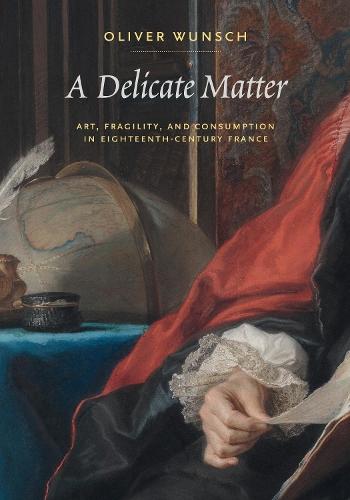Full Product Details
Author: Oliver Wunsch (Boston College)
Publisher: Pennsylvania State University Press
Imprint: Pennsylvania State University Press
Dimensions:
Width: 17.80cm
, Height: 2.00cm
, Length: 25.40cm
Weight: 0.885kg
ISBN: 9780271095288
ISBN 10: 0271095288
Pages: 192
Publication Date: 30 January 2024
Audience:
Professional and scholarly
,
Professional & Vocational
Format: Hardback
Publisher's Status: Active
Availability: Available To Order

We have confirmation that this item is in stock with the supplier. It will be ordered in for you and dispatched immediately.
Reviews
“In an era of scholarship drunk on the sociological demystification of art, Oliver Wunsch’s book offers us that rare thing—a study of the social forces shaping art that illuminates aesthetic achievement.” —Michael W. Clune Critical Inquiry “Wunsch’s elegant, jargon-free writing deftly integrates voices from numerous primary sources and presents complex ideas with a remarkable balance of clarity and nuance.” —Mimi Hellman caa.reviews “Central to Wunsch’s remarkably tight-focused book is the suggestion that the perishability of art, long seen by art historians as little more than an impediment to research, is a subject of interest in itself; a feature, rather than a bug.” —Kirsten Tambling Apollo Magazine “Wunsch describes the ongoing struggle to create desirable art objects that would resist the vagaries of fashion. With its organisation according to medium, the book unfolds under the sign of the material turn in the field of art history. Yet it is as much a book about the discursive work that arose in the wake of technical experimentation, as critics and artists sought to resist the pleasure of things, the thingness of artworks, and the delirium of consumption.” —Marika Takanishi Knowles French History “[Wunsch] shows that material impermanence is not just the bane of conservators, or a cause for regret, but deserves investigation as a cultural phenomenon in its own right. . . . A Delicate Matter succeeds in combining a meticulous discussion of visual and material forms with eighteenth-century philosophical reflection and wider sociocultural shifts. It is concise, tightly argued, beautifully designed and provocative” —Tom Stammers Burlington Magazine “A Delicate Matter is an important contribution to the material history of eighteenth-century French art, and its focus on major artists, combined with its sharp assessment of the new social and economic dynamics governing the eighteenth-century art world, also makes it an essential reading for non-specialists, who will appreciate its clear and vivid prose.” —Frédérique Baumgartner Journal for Eighteenth-Century Studies “A lyrical and witty rereading of eighteenth-century French art that connects the popularity of physically fragile artworks—from cracking Watteau paintings to precarious Clodion terracottas by way of disintegrating pastel paintings and quixotic experiments with encaustic—to a nascent consumer culture dependent on ephemeral goods. Wunsch adroitly joins sophisticated technical analysis to a thought-provoking argument about the ways in which the market shaped artistic practice, art collecting, and aesthetic theory.” —Amy Freund, author of Portraiture and Politics in Revolutionary France
“A lyrical and witty rereading of eighteenth-century French art that connects the popularity of physically fragile artworks—from cracking Watteau paintings to precarious Clodion terracottas by way of disintegrating pastel paintings and quixotic experiments with encaustic—to a nascent consumer culture dependent on ephemeral goods. Wunsch adroitly joins sophisticated technical analysis to a thought-provoking argument about the ways in which the market shaped artistic practice, art collecting, and aesthetic theory.” —Amy Freund,author of Portraiture and Politics in Revolutionary France
“In an era of scholarship drunk on the sociological demystification of art, Oliver Wunsch’s book offers us that rare thing—a study of the social forces shaping art that illuminates aesthetic achievement.” —Michael W. Clune Critical Inquiry “A lyrical and witty rereading of eighteenth-century French art that connects the popularity of physically fragile artworks—from cracking Watteau paintings to precarious Clodion terracottas by way of disintegrating pastel paintings and quixotic experiments with encaustic—to a nascent consumer culture dependent on ephemeral goods. Wunsch adroitly joins sophisticated technical analysis to a thought-provoking argument about the ways in which the market shaped artistic practice, art collecting, and aesthetic theory.” —Amy Freund, author of Portraiture and Politics in Revolutionary France
“In an era of scholarship drunk on the sociological demystification of art, Oliver Wunsch’s book offers us that rare thing—a study of the social forces shaping art that illuminates aesthetic achievement.” —Michael W. Clune Critical Inquiry “A lyrical and witty rereading of eighteenth-century French art that connects the popularity of physically fragile artworks—from cracking Watteau paintings to precarious Clodion terracottas by way of disintegrating pastel paintings and quixotic experiments with encaustic—to a nascent consumer culture dependent on ephemeral goods. Wunsch adroitly joins sophisticated technical analysis to a thought-provoking argument about the ways in which the market shaped artistic practice, art collecting, and aesthetic theory.” —Amy Freund,author of Portraiture and Politics in Revolutionary France
Author Information
Oliver Wunsch is Assistant Professor of Art History at Boston College.



